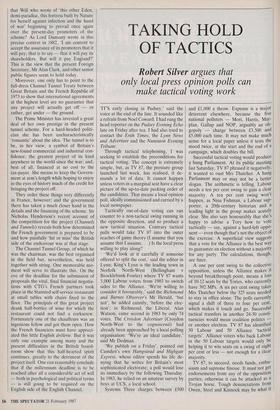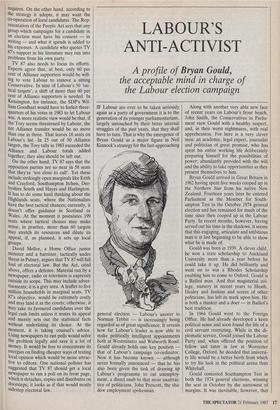TAKING HOLD OF TACTICS
Robert Silver argues that
only local press opinion polls can make tactical voting work
'IT'S early closing in Pudsey,' said the voice at the end of the line. It sounded like a refrain from Noel Coward. I had rung the head reporter on the Pudsey Evening Echo late on Friday after tea. I had also tried to contact the Erith Times, the Lynn News and Advertiser and the Nuneaton Evening Tribune.
Through tactical telephoning, I was seeking to establish the preconditions for tactical voting. The concept is extremely simple, but, as TV 87, the pressure group launched last week, has realised, it de- mands a lot of data. It cannot happen unless voters in a marginal seat have a clear picture of the up-to-date pecking order of the candidates. That means a local opinion poll, ideally commissioned and carried by a local newspaper.
Tactically out-of-date voting can run counter to a non-tactical swing running in the opposite direction, and so produce a new tactical situation. Contrary tactical pulls would take TV 87 into the outer reaches of game theory (I assume that you assume that I assume. . .) Is the local press willing to play along? • `We'd look at it carefully if someone offered to split the cost,' said the editor in Lynn; King's Lynn is the leading town in Norfolk North-West (Bellingham v Brocklebank-Fowler) where TV 87 wants 3,000 Labour voters from 1983 to switch sides to the Alliance. 'We're willing to consider it favourably,' said the Richmond and Barnes Observer's Mr Herald, 'but not', he added cannily, 'before the elec- tion'; in Richmond, the Liberal, Alan Watson, came second in 1983 by only 74 votes. The Croydon Advertiser (Croydon North-West to the cognoscenti) had already been approached by a local polling organisation: 'We're an ideal candidate,' said Mr Dedman.
'We publish on a Friday', pointed out Camden's own Hampstead and Highgate Express, whose editor spends his life de- nying that he writes for Britain's most sophisticated electorate; a poll would lose its immediacy by the following Thursday. In 1983, he relied on an amateur survey by boys at UCS, a local school.
Systems Three charges between £500 and £1,000 a throw. Expense is a major deterrent elsewhere, because the five national pollsters — Mori, Harris, Mar- plan, Gallup and NOP, arguably an oli- gopoly — charge between £3,500 and £5,000 each time. It may not make much sense for a local paper unless it tests the mood twice, at the start and the end of a campaign, which doubles the bill. Successful tactical voting would produce I hung Parliament. At its public meeting last Saturday, TV 87 phrased it negatively; it wanted to oust Mrs Thatcher. A hung Parliament may or may not be a better slogan. The arithmetic is telling. Labour needs a ten per cent swing to gain a clear majority. A ten per cent swing won't happen, as Nina Fishman, a Labour sup- porter, a 20th-century historian and a leading light in the group makes acutely clear. She also says honourably that she's happy to advise a Tory how to vote tactically — say, against a hard-left oppo- nent — even though that's not the object of the exercise. A superficial view suggests that a vote for the Alliance is the best way to guarantee an election without a majority for any party. The calculations, though, are finer.
A one per cent swing to the collective opposition, unless the Alliance makes it beyond breakthrough point, means a loss of 10-12 seats by the Tories, who currently have 392 MPs. A six per cent swing takes Mrs Thatcher below the 325 seats needed to stay in office alone. The polls currently signal a shift of three to four per cent, which makes it touch and go. Successful tactical transfers in another 24-30 consti- tuencies would mean coalition politics or another election. TV 87 has identified 50 Labour and 50 Alliance 'tactical targets'. Alliance voters who back Labour in the 50 Labour targets would only be helping it to win seats on a swing of eight per cent or less — not enough for a clear majority.
TV 87, to succeed, needs funds, enthu- siasm and supreme finesse. It must not get endorsements from any of the opposition parties; otherwise it can be attacked as a Trojan horse. Tough denunciations from Owen, Steel and Kinnock may be what it requires. On the other hand, according to the strategy it adopts, it may want the co-operation of local candidates. The Rep- resentation of the People Act says that any group which campaigns for a candidate in an election must have his consent — in writing — and what it spends is added to his expenses. A candidate who quotes TV 87's support in his literature may run into problems from his own party.
TV 87 also needs to focus its efforts. Experts agree that, at best, only 60 per cent of Alliance supporters would be will- ing to vote Labour to remove a sitting Conservative. In nine of Labour's 50 'tac- tical targets', a shift of more than 60 per cent of Alliance supporters is needed. In Kensington, for instance, the SDP's Wil- liam Goodhart would have to forfeit three- quarters of his votes in 1983 to let Labour Win. A more realistic view would be that, if the Tory seems threatened by Labour, the net Alliance transfer would be no more than one in three. That leaves 18 seats on Labour's list. In 25 out of 50 Alliance targets, the Tory tally in 1983 exceeded the Alliance and Labour totals added together; they also should be left out.
On the other hand, TV 87 says that the opposition parties are so near in 58 seats that they're 'too close to call'. Yet these include strikingly open marginals like Erith and Crayford, Southampton Itchen, Der- byshire South and Hayes and Harlington. It has to do some hard thinking about the Highlands seats, where the Nationalists have the best tactical chances; currently, it doesn't offer guidance in Scotland or Wales. At the moment it postulates 199 seats where tactical choices may make sense; in practice, more than 60 targets may stretch its resources and dilute its appeal, if, as planned, it sets up local groups.
David Mellor, a Home Office junior minister and a barrister, tactically under threat in Putney, argues that TV 87 will fall foul of electoral law. But the Act, cited above, offers a defence. Material run by a newspaper, radio or television is expressly outside its scope. This may include adver- tisements; it is a grey area. A leaflet to five million households in marginal seats, TV 87's objective, would be extremely costly and may land it in the courts; otherwise, it may take its favoured candidates over the legal cash limits unless it mutes its appeal and merely sets out the statistical facts without underlining its choice. At the moment, it is taking counsel's advice. Using newspapers to run polls would solve the problem legally and save it a lot of money. It would be free to concentrate its energies on finding cheaper ways of testing local opinion which would be more attrac- tive to editors. One national pollster has suggested that TV 87 should get a local newspaper to run a poll on its front page, which it detaches, copies and distributes on doorsteps; it looks as if that would neatly sidestep electoral law.



















































 Previous page
Previous page